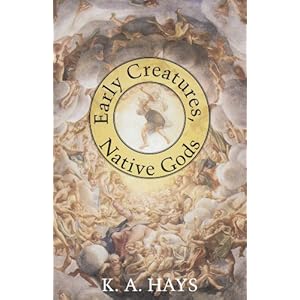January Poetry Roundup
 As Carl Phillips said, “The truest poetry speaks to us not as documentation . . . but as confirmation—echo—of something essential to being human, flawed, mortal.” Because we Algonkians are voracious readers of verse as well as prose, we’ve inaugurated a new series of blog posts for 2012: every month, we’ll be rounding up some of our favorite recently or soon-to-be published poetry books. Enjoy!
As Carl Phillips said, “The truest poetry speaks to us not as documentation . . . but as confirmation—echo—of something essential to being human, flawed, mortal.” Because we Algonkians are voracious readers of verse as well as prose, we’ve inaugurated a new series of blog posts for 2012: every month, we’ll be rounding up some of our favorite recently or soon-to-be published poetry books. Enjoy!
Early Creatures, Native Gods
K. A. Hays
(recommended by Lauren Moseley)
In K. A. Hays’ second book of poems, out this month from Carnegie Mellon University Press, the speaker’s spiritual quest is both more urgent and full of doubt than it was in her first collection, Dear Apocalypse. In Early Creature, Native Gods, the soul is “at best, an idea or prayer the body has,” while skepticism is “a way of slowly offering a hand.” As much as the speaker rejects the existence of an omnipotent being, she repeatedly sees the mundane through a religious lens. For example, take her poem “Assumption”:
When a house occupies the last edge of ground
before the sea, and turns three faces to the tides,
that house is bound to flood. When the wind tilts rain
to the shingles, and the goosebumped skin
of the sea draws near, a person in the kitchen,
where rain pings in a bucket, might take comfort
in the story of the Virgin, who stayed whole
through the Assumption’s whirl and swagger,
then walked, unhurt,
to heaven. But—this body, shingled,
set in earth, breaks down. Falls loose.
Will not be assumed.
Given her poems’ vivid imagery, multiple layers, and sense of conflict, it’s no wonder Motionpoems chose Hays’ “Just As, After a Point, Job Cried Out” for their most recent short film. Whether accompanied by stunning animation or resting in lines on the page, Hays’ words will haunt you as only the “the truest poetry” can.
~~~~~~~~~~
Darkroom
Jazzy Dazinger
(recommended by Megan Fishmann)
Full disclosure: Jazzy Dazinger and I both attended UVA’s MFA program and did a joint reading at Bel Rio in Belmont. I’m thrilled that she recently won the Brittingham Prize in Poetry; Wisconsin University Press will publish her debut collection, Darkroom, March 26th.
In one of my favorite poems, “The Psychiatrist Teen Daughter Self-Evaluates,” Dazinger criticizes her teenage self:
When I was thirteen, Isabella Lombardi taught me
how to get a boy to approach you in the mall:
make eye contact as they come at you, lock your gaze
on them, then find a bench and sit down.
There are two kinds of boys, she said, those who follow me
and those who follow me. In other words,
she never failed.
Dazinger’s ghost women float through this poem: the bad girl teenager lamenting to her father, the bully of a friend who pushes impressionable girls to break all the rules. She continues, later in the poem:
Three months before my mother died
she bought me a silver dress that was too small for me.
She didn’t know this before she said, “You’ll look like Miss America,” since there are two
ways
to measure a daughter’s size: through the forgiving lens of love
and through the pucker of an unforgiving fabric.
Darkroom follows a young woman in the aftermath of her mother’s suicide; what makes Dazinger’s voice so powerful is the act of embracing the mother’s ghost. It is her evocative and painful memories, so beautifully composed, that linger with me still.
-
Overall Score
Reader Rating: 0 Votes



